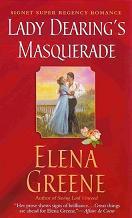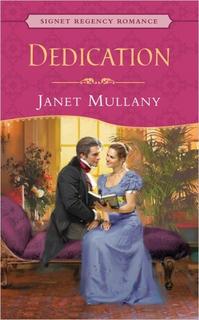
Elena grew up reading her mother’s favorite Regencies, and after being sent on an international assignment to England she could no longer resist the urge to write her own. Her stories have won the National Readers’ Choice Award, the Golden Quill and the Award of Excellence. Learn more at http://www.elenagreene.com/

Praise for LADY DEARING’s MASQUERADE!
“LADY DEARING’S MASQUERADE could have been a dark, depressing story considering its many tragedies: orphaned foundlings, throwaway babies, malicious gossip, years of abuse. But it’s a tribute to Elena Greene that the story is poignant, and the admirable way in which Jeremy and Livvy deal with their trials endears them to readers and will have you rooting for them to unite.” — Romantic Times Bookclub
4 1/2 Stars, TOP PICK!
“The characters of this remarkable tale sparkle with sensitivity, wit, humor, and a genuine quality that will make them stand out in readers’ minds long after the last page is turned… For a story that is sure to stoke the romantic fires burning in every Regency fan, be sure not to miss LADY DEARING’S MASQUERADE.” — Edith Morrison, for Romance Reviews Today Read the review
“This was a very well written novel, with great characters and a terrific (and plausible) plot… I’ll definitely be looking for more books by Elena Greene.” — Lynn Lamy, for Rakehell Reviews Read the review
The Interview
Q. How did you think of writing this particular book? Did it start with a character, a setting, or some other element?
It started with Livvy (Lady Dearing), who appeared in “The Wedding Wager”, a novella I wrote a few years ago. She helped the couple in that story get together, but said she did not want a romance for herself. An irresistible challenge! At the time I knew that her first marriage had been bad, but it wasn’t until I got well into writing the story that I figured out just how bad. So somehow a minor character from a story that was short, fun and fluffy now stars in the longest and most angsty book I’ve written to date.
Q. How long did it take? Was this an easy or difficult book to write?
This book took about 10 months and 6 drafts (as opposed to my usual 4), and as Jennifer Crusie says of her own work, “there’s blood on every page.” It’s not only a longer story (about 90,000 words as opposed to the more typical 65-75,000 for a standard-length Regency), but I was also dealing with more serious issues than I’ve ever written into a book before and frankly I was plagued with self-doubts.
Several other things complicated the progress of the story. When I first suggested it to my editor, we both thought it was going to be a standard-length Regency. But once I’d gotten about 100 pages into the first draft, I knew it was a bigger story. Since it was not yet contracted, she agreed to make it a Super Regency, but a while later, after I’d completed the first draft, I was told they wanted to discontinue Supers and asked if I could cut it back. By that point I’d gone so deep into the story it would have required major surgery to do it, so I was relieved when my editor went to bat for me and it was kept a Super Regency. And then there was some confusion about pub dates, which meant I half-killed myself to complete the story earlier than it needed to be. I felt I hadn’t done my best work, cried all the way back from the post office before diving into some Ben & Jerry’s. So it was a relief to learn there was time for revisions, which were pretty extensive.
It just proves that even with a conscientious author and a very nice, very supportive editor, things can go wrong. But it’s over now, and I’m very proud of my “problem child”.
Q. Tell me more about your characters. What or who inspired them?
I already talked about Livvy, my starting point for the story. When I brought Jeremy into being, I wanted him to be both the best and worst thing that could happen to her. So I made him ultra-respectable (as a foil to her notoriety) but also extremely kind. I think of him as the sort of character Colin Firth often plays: gentlemanly, honorable but with a simmering restrained passion. I wish the guy on the cover looked more like Firth, since that’s who I had pictured in my mind (and what I put in my suggestions to the art department).
Q. Did you run across anything new and unusual while researching this book?
London’s Foundling Hospital figures heavily in the book. When I researched the Hospital (making use of an excellent book titled CORAM’S CHILDREN, by Ruth McClure), I learned that Regency society’s attitude toward foundling children was much less sympathetic, on average, than our own. Foundlings were usually the result of illicit unions and many believed that children born in sin were prone to evil and unworthy of aid. This prejudice tied in thematically with society’ misjudgment of my heroine, Livvy, though perhaps I shouldn’t mention that. I’m not sure I want readers to know there are themes here, it sounds so literary!
The other main area of my research was in women’s reproductive health. Regency medicine had some frightening ways of dealing with any difficulties with conception and pregnancy, including a “lowering regimen” (a diet which would have limited a woman’s intake of calcium and iron) and bloodletting. Overall, the course of treatment seemed design to weaken women, at a time in history when the Victorian ideal of submissive, proper womanhood was beginning to form. So another theme in the book was Livvy’s struggle to maintain her integrity against the men who tried to control her. Here again, I hope that it came through naturally in the story!
Q. What do you think is the greatest creative risk you’ve taken in this book? How do you feel about it?
Even though writers like Mary Balogh were doing sex in Regencies way before I even started writing, some readers still object to it. But I knew I was going to take that risk when I started, because I knew this story would have to go that way and the ellipsis (…) just wasn’t going to have the same emotional power. And much less fun to write! 🙂
I also dealt with several of the harsh realities of Regency England–the fact that husbands had nearly complete power over their wives, and the grim situation of unwanted children. I felt that softening these things would have weakened the story, but I’m bracing myself for the reactions of readers who like their Regencies “cozy”. (Not that I have anything against “cozy” Regencies! I’ve written a few of them myself. This just isn’t one.)
The scenes that felt the most risky to me were the flashbacks into Livvy’s first marriage.
Q. Is there anything you wanted to include in the book that you (or your CPs or editor) felt was too controversial and left out?
Actually, no. I took lots of wrong turns in the process of bashing this manuscript into shape, but I don’t miss any of the deletions. I’m also very grateful to my editor for not making me take anything out.
Q. Lady Dearing is a widow with a scandal attached to her name; you’ve also written about young, virtuous debutantes. Which is your favorite kind of heroine to write about?
I don’t have a favorite in terms of age, marital status, etc… But one thing my heroines all have in common is that they are seeking something. Some readers have called my heroines selfish, but I think they’re just real women trying to come into their strength. They make all sorts of mistakes, but they won’t be passive Cinderellas waiting for someone to rescue them.
Q. As a mother yourself, you know romance and kids don’t always go together. How was it writing a romance involving children? Is there any author you feel does it particularly well?
Wow, good question! You may have hit on the riskiest element in this story–a plot that revolves around children and sex. There are a couple of reasons why that mix can be dodgy. I think some people are uncomfortable with the innocence of children and adult passion in the same book. As if sex and parenthood were not somehow connected! The other reason is that, well, obviously, the pressures of parenthood can play havoc with one’s sex life. Anyone who’s had an attempt at lovemaking interrupted multiple times by a crying child knows what I’m talking about.
But I like to show my heroines experiencing (or at least looking forward to) a life that includes passion and children. And by the end of any romance, I want to feel the h/h are so deeply devoted that they will keep things hot whatever life throws their way. Otherwise he could just go running back to his mistress, right? Of course, if Livvy and Jeremy feel the need for a brief getaway to London, they’ve got a governess and the rest of their household staff to keep the kiddos in order!
As for romances involving children, I have to say I’ve read too many that didn’t work for me at all. Sometimes the kids are just cute props: cherubic Victorian-greeting-card children rather than flesh-and-blood kids who may be cute, but also fight, make messes and pick their noses at inappropriate moments! And some authors don’t seem to “get” motherhood. If a heroine is searching for her kidnapped child, is she really going to be checking out every hunk she meets along the way?
But some authors do combine children and romance in a way that works. Between my own kids and writing, I don’t get as much time to read as I’d like, so I’m sure I’m missing many! But the books I’ve read by Susan Elizabeth Phillips had very realistic children. But then all her characterizations are strong. I’ll also add a word about my blog buddy, Janet Mullany. Her debut book, DEDICATION, deals with issues of parenthood and even grandparenthood, in a realistic and touching manner. And the sex is pretty hot, too!
Q. What are you working on now?
I’m working on a Regency historical romance, and the hero is neither a duke nor a spy. Sorry, but I’m not ready to say much more yet. My first drafts resemble my final books about as closely as a newly fertilized egg cell resembles a bouncing, cuddly baby. At this point the idea might just sound stupid. That would be bad. 🙂
Thanks for interviewing me!





